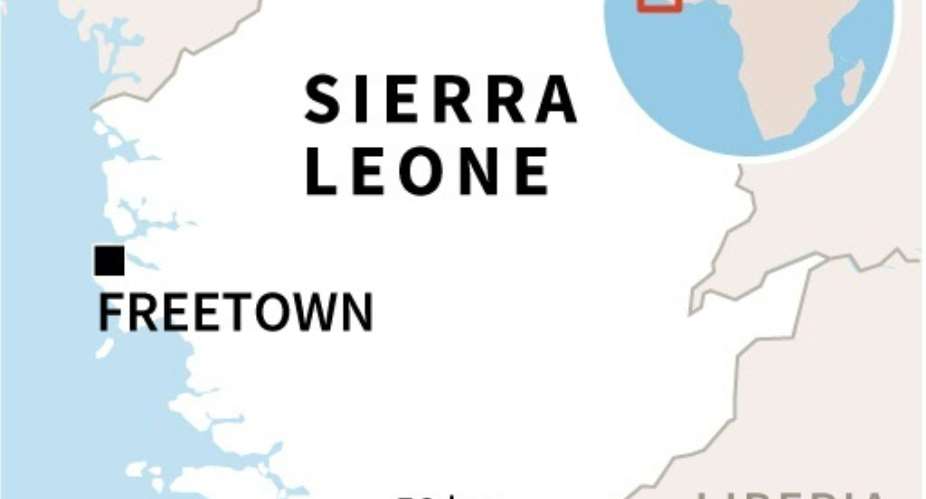A prominent radio station in Sierra Leone went off air Wednesday shortly before a pre-recorded interview with the US ambassador highlighting concerns about the general election was due to be broadcast.
Radio Democracy 98.1 temporarily went off the airwaves during Wednesday's breakfast programme, when an interview with US Ambassador David Reimer, recorded a day earlier, was due to be broadcast.
In a leaked recording of part of the interview authenticated by the embassy, Reimer can be heard enumerating Washington's concerns about the disputed June 24 vote and "the integrity and the credibility of the results" announced by the Electoral Commission of Sierra Leone (ECSL).
"The United States is concerned about irregularities in the results that were announced by the ECSL -- that includes a big difference between the ECSL announced results and the parallel vote tabulation, as well as inconsistencies that were analysed by domestic and international observers," Reimer said.
"All of these things raise questions in our mind... about the integrity of the official results."
International observers had noted "statistical inconsistencies" and condemned a "lack of transparency" in the ballot count.
A national observation group also found significant discrepancies between voter results for presidential, parliamentary and local council elections.
Sarah Van Horne, a US embassy public affairs officer, confirmed to AFP that the interview had been recorded on Tuesday to be broadcast on Wednesday, but that it was not aired.
She said the embassy has been told it will instead air on Thursday.
Reimer affirmed in the interview that President Julius Maada Bio, who won 56 percent of the presidential vote, according to official results, was president.
But, he said, "What we have not done is congratulated him."
He said the US would not change its work "with the people of Sierra Leone", including health programmes, but would review its government-to-government programmes, including a Millennium Challenge Corporation (MCC) compact grant worth hundreds of millions of dollars.
"In the year or two preceding the compact, we were very clear with the government of Sierra Leone that in order to get a compact they needed to have a fair, free, open and transparent election," he said.
"Sierra Leone had done everything else up to that point to get a compact... (but) given the fact that there are all sorts of questions about the results, we're taking a look at everything, and that includes the MCC compact."
He said Washington would like to see an "outside, independent look at the election" and a government dialogue with civil society and political parties.
Bio in early August announced that a committee comprising members of civil society and development partners would be set up to review the vote, under the leadership of his vice president.
But, Reimer said in the interview, "It's just not possible for someone who was a candidate in the election to then look at the process and be not biased."
The opposition All People's Congress (APC), which disputes the results, has refused to participate in local or national government, with most MPs boycotting parliament since it opened for business in July.
Reimer called on the APC not to boycott government and to serve the Sierra Leoneans who voted for the party.





 Ejisu by-election: EC refers alleged bribery incident to Police for investigatio...
Ejisu by-election: EC refers alleged bribery incident to Police for investigatio...
 Bright Simons writes: How SML confused Ghanaian professors
Bright Simons writes: How SML confused Ghanaian professors
 Ejisu by-election: The envelope for officials was for lunch – EC
Ejisu by-election: The envelope for officials was for lunch – EC
 Ejisu by-election: Provisional results so far
Ejisu by-election: Provisional results so far
 2024 Election: Suncity FM boss Ransford Antwi goes Independent for Sunyani East
2024 Election: Suncity FM boss Ransford Antwi goes Independent for Sunyani East
 70% of SMEs' productivity lost to power crises in Central Region
70% of SMEs' productivity lost to power crises in Central Region
 Ejisu by-election: Don’t condemn our officials, we’re probing content of envelop...
Ejisu by-election: Don’t condemn our officials, we’re probing content of envelop...
 Government's vision is to end streetism in Ghana - Bawumia
Government's vision is to end streetism in Ghana - Bawumia
 NACOC intercepts 20.5KG worth of cannabis at postal and courier centers
NACOC intercepts 20.5KG worth of cannabis at postal and courier centers
 [VIDEO]: Ghanaian man catches wife in bed with younger lover; uses to juju cause...
[VIDEO]: Ghanaian man catches wife in bed with younger lover; uses to juju cause...
